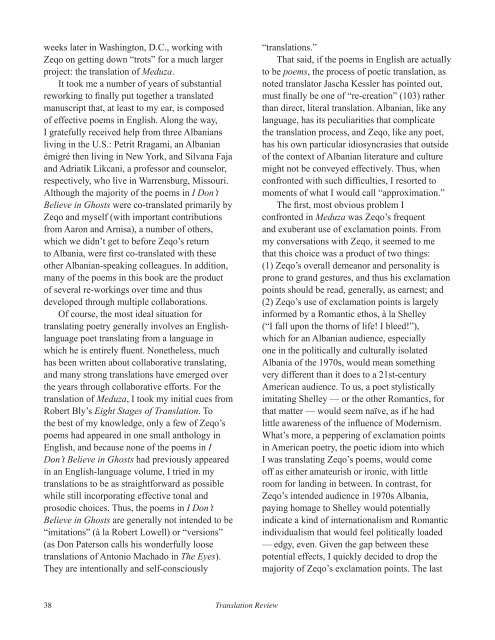Table of contents - The University of Texas at Dallas
Table of contents - The University of Texas at Dallas
Table of contents - The University of Texas at Dallas
Create successful ePaper yourself
Turn your PDF publications into a flip-book with our unique Google optimized e-Paper software.
weeks l<strong>at</strong>er in Washington, D.C., working with<br />
Zeqo on getting down “trots” for a much larger<br />
project: the transl<strong>at</strong>ion <strong>of</strong> Meduza.<br />
It took me a number <strong>of</strong> years <strong>of</strong> substantial<br />
reworking to finally put together a transl<strong>at</strong>ed<br />
manuscript th<strong>at</strong>, <strong>at</strong> least to my ear, is composed<br />
<strong>of</strong> effective poems in English. Along the way,<br />
I gr<strong>at</strong>efully received help from three Albanians<br />
living in the U.S.: Petrit Rragami, an Albanian<br />
émigré then living in New York, and Silvana Faja<br />
and Adri<strong>at</strong>ik Likcani, a pr<strong>of</strong>essor and counselor,<br />
respectively, who live in Warrensburg, Missouri.<br />
Although the majority <strong>of</strong> the poems in I Don’t<br />
Believe in Ghosts were co-transl<strong>at</strong>ed primarily by<br />
Zeqo and myself (with important contributions<br />
from Aaron and Arnisa), a number <strong>of</strong> others,<br />
which we didn’t get to before Zeqo’s return<br />
to Albania, were first co-transl<strong>at</strong>ed with these<br />
other Albanian-speaking colleagues. In addition,<br />
many <strong>of</strong> the poems in this book are the product<br />
<strong>of</strong> several re-workings over time and thus<br />
developed through multiple collabor<strong>at</strong>ions.<br />
Of course, the most ideal situ<strong>at</strong>ion for<br />
transl<strong>at</strong>ing poetry generally involves an Englishlanguage<br />
poet transl<strong>at</strong>ing from a language in<br />
which he is entirely fluent. Nonetheless, much<br />
has been written about collabor<strong>at</strong>ive transl<strong>at</strong>ing,<br />
and many strong transl<strong>at</strong>ions have emerged over<br />
the years through collabor<strong>at</strong>ive efforts. For the<br />
transl<strong>at</strong>ion <strong>of</strong> Meduza, I took my initial cues from<br />
Robert Bly’s Eight Stages <strong>of</strong> Transl<strong>at</strong>ion. To<br />
the best <strong>of</strong> my knowledge, only a few <strong>of</strong> Zeqo’s<br />
poems had appeared in one small anthology in<br />
English, and because none <strong>of</strong> the poems in I<br />
Don’t Believe in Ghosts had previously appeared<br />
in an English-language volume, I tried in my<br />
transl<strong>at</strong>ions to be as straightforward as possible<br />
while still incorpor<strong>at</strong>ing effective tonal and<br />
prosodic choices. Thus, the poems in I Don’t<br />
Believe in Ghosts are generally not intended to be<br />
“imit<strong>at</strong>ions” (à la Robert Lowell) or “versions”<br />
(as Don P<strong>at</strong>erson calls his wonderfully loose<br />
transl<strong>at</strong>ions <strong>of</strong> Antonio Machado in <strong>The</strong> Eyes).<br />
<strong>The</strong>y are intentionally and self-consciously<br />
“transl<strong>at</strong>ions.”<br />
Th<strong>at</strong> said, if the poems in English are actually<br />
to be poems, the process <strong>of</strong> poetic transl<strong>at</strong>ion, as<br />
noted transl<strong>at</strong>or Jascha Kessler has pointed out,<br />
must finally be one <strong>of</strong> “re-cre<strong>at</strong>ion” (103) r<strong>at</strong>her<br />
than direct, literal transl<strong>at</strong>ion. Albanian, like any<br />
language, has its peculiarities th<strong>at</strong> complic<strong>at</strong>e<br />
the transl<strong>at</strong>ion process, and Zeqo, like any poet,<br />
has his own particular idiosyncrasies th<strong>at</strong> outside<br />
<strong>of</strong> the context <strong>of</strong> Albanian liter<strong>at</strong>ure and culture<br />
might not be conveyed effectively. Thus, when<br />
confronted with such difficulties, I resorted to<br />
moments <strong>of</strong> wh<strong>at</strong> I would call “approxim<strong>at</strong>ion.”<br />
<strong>The</strong> first, most obvious problem I<br />
confronted in Meduza was Zeqo’s frequent<br />
and exuberant use <strong>of</strong> exclam<strong>at</strong>ion points. From<br />
my convers<strong>at</strong>ions with Zeqo, it seemed to me<br />
th<strong>at</strong> this choice was a product <strong>of</strong> two things:<br />
(1) Zeqo’s overall demeanor and personality is<br />
prone to grand gestures, and thus his exclam<strong>at</strong>ion<br />
points should be read, generally, as earnest; and<br />
(2) Zeqo’s use <strong>of</strong> exclam<strong>at</strong>ion points is largely<br />
informed by a Romantic ethos, à la Shelley<br />
(“I fall upon the thorns <strong>of</strong> life! I bleed!”),<br />
which for an Albanian audience, especially<br />
one in the politically and culturally isol<strong>at</strong>ed<br />
Albania <strong>of</strong> the 1970s, would mean something<br />
very different than it does to a 21st-century<br />
American audience. To us, a poet stylistically<br />
imit<strong>at</strong>ing Shelley — or the other Romantics, for<br />
th<strong>at</strong> m<strong>at</strong>ter — would seem naïve, as if he had<br />
little awareness <strong>of</strong> the influence <strong>of</strong> Modernism.<br />
Wh<strong>at</strong>’s more, a peppering <strong>of</strong> exclam<strong>at</strong>ion points<br />
in American poetry, the poetic idiom into which<br />
I was transl<strong>at</strong>ing Zeqo’s poems, would come<br />
<strong>of</strong>f as either am<strong>at</strong>eurish or ironic, with little<br />
room for landing in between. In contrast, for<br />
Zeqo’s intended audience in 1970s Albania,<br />
paying homage to Shelley would potentially<br />
indic<strong>at</strong>e a kind <strong>of</strong> intern<strong>at</strong>ionalism and Romantic<br />
individualism th<strong>at</strong> would feel politically loaded<br />
— edgy, even. Given the gap between these<br />
potential effects, I quickly decided to drop the<br />
majority <strong>of</strong> Zeqo’s exclam<strong>at</strong>ion points. <strong>The</strong> last<br />
38 Transl<strong>at</strong>ion Review

















